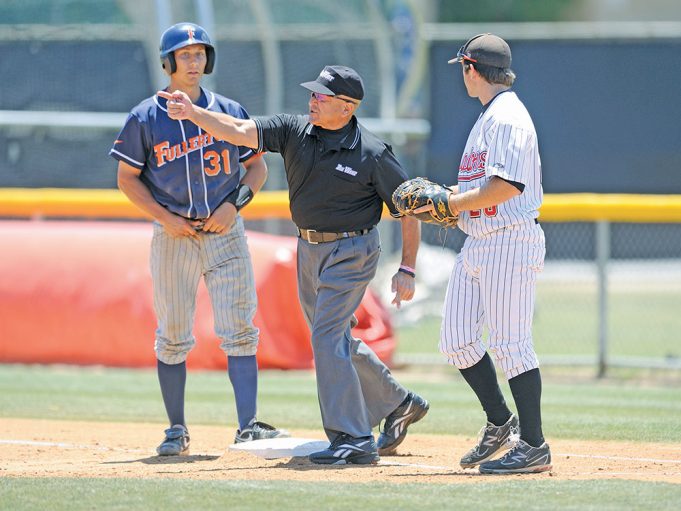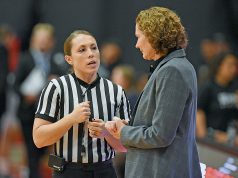The score is tied in the championship basketball game with less than a minute remaining. The fans in the packed arena are on their feet screaming for their team while television and internet viewers across the nation and beyond look on.
On a fast break to the basket, a guard slices through the lane while a defender quickly works to get into position to draw a player-control foul. Both players collide en route to their own personal destination on the floor and the nearby official suddenly has a big decision to make: block or charge?
Is that official going to wait and confer with his or her partners before blowing the whistle? Maybe take a look at the courtside replay screen? No. That ruling is going to be made in a heartbeat after the bodies are flying. Whether it’s a block or charge, the official is going to sell it and let the world know the decision through his or her mechanics, positioning on the court, knowledge of the rules and courage, which combine all at once, in a moment, as he or she sells the ruling.
Some will like it. Others won’t. But the effort expended to put sizzle into the sale is an exclamation point that the decision on the play is final.
Selling a ruling is an essential part of officiating
Selling a ruling, whether it’s a safe/out at the plate or on the bases in baseball and softball, or ruling that a football player is down because the ground caused a fumble, is an essential part of officiating. It is sometimes necessary and very effective as long as you don’t do it too often during a game. Do that and coaches, players and fans get angry and turned off.
Routine rulings on the court or field need good signals as well, but close rulings need a little extra decisiveness, emphasis and command to communicate to everyone clearly. With that, remember that it’s also important not to oversell because officials don’t want to appear to get caught up in the emotion of the game or match.
Proper selling usually improves with experience. Signal immediately, but don’t rush because you’ve still got to process the information from the play to get it right. But once you’ve done that, don’t hesitate with a signal. For example, in basketball if a shot attempt is after time has expired, signal emphatically while facing the table as the horn sounds and the ball is still in the player’s hands. If the player gets the shot off and the ball goes in, you’ve already signaled that it’s too late while not even looking at the basket, which helps sell the ruling and shows you are confident in it.
Decisiveness is key for any official when making a ruling. It can be a display of confidence that will resonate with your partners, coaches and players as long as other components are in place.
Those include: importance of the ruling or nature of what is being decided upon; commitment to carry out the decisions, no matter how difficult; and correctness of the decision. It’s letting everyone know that you know the ruling when you see it — like raising your voice to get a point across to someone.
Before an official can develop decisiveness in an effort to help sell a ruling, he or she needs to have a good knowledge of the rules.
People will forgive occasional poor judgment, but not a lack of knowing the rules. What’s worse is thinking you know a rule and then realizing you’re wrong. That makes selling a ruling either that much more of a challenge or obvious that you may be trying to cover a mistake.
An official could be a walking, talking Google search engine when it comes to the rulebook, but that isn’t a guarantee that he or she will combine that knowledge with mechanics when trying to sell a ruling. In fact, being in the right place at the right time adds a ton of credibility when selling a ruling.
Solid mechanics make for a finishing touch. Even though you know you nailed a ruling, if your body language indicates that you’re not sure or if there is any kind of hesitation, it provides a hint of doubt that coaches and players will use against you. But being where you are supposed to be and watching what you’re supposed to watch goes a long way toward selling a ruling.
Do officials ever get “good enough” to stop learning? To stop working on their mechanics, positioning and rules knowledge? The great officials always continue to work on all of the above because in the moment of truth, that’s when it all comes together. That type of official will have fewer problems when the game is on the line and he or she has to quickly decide on, for example, a block/charge late in a big game. They can convince everyone they got the ruling right by properly selling it.
Strive to make the right rulings at the right time with confidence and integrity, and when the situation calls for it. Sell it based on a decision that you take responsibility for and can support.
What's Your Call? Leave a Comment:
Note: This article is archival in nature. Rules, interpretations, mechanics, philosophies and other information may or may not be correct for the current year.
This article is the copyright of ©Referee Enterprises, Inc., and may not be republished in whole or in part online, in print or in any capacity without expressed written permission from Referee. The article is made available for educational use by individuals.


















